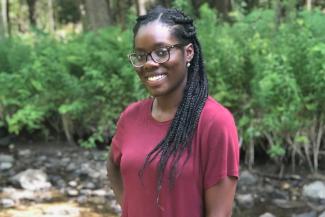
We sat down with alumna Dr. Temiloluwa O. Prioleau (BSEE, 2010) to discuss her career in electrical and computer engineering. Dr. Prioleau received her BSEE from Texas ECE in 2010 and went on to receive her PhD in Electrical Engineering from Georgia Tech in 2016. After a postdoctoral position at Rice University, she joined Dartmouth College as an Assistant Professor of Computer Science in January 2019.
You received your BSEE from UT and then pursued graduate school and received your PhD from Georgia Tech. From the beginning of your academic career did you always intend to pursue a PhD?
It was not until the beginning of my 4th year as an undergraduate student that I started considering a Ph.D. Before then, I interned in industry for two summers and my plan was to return to industry upon graduation. However, in my 3rd year as an undergrad, two friends who were Ph.D. students took the time to invite me to their labs and share more details about what they worked on. This sparked my curiosity on topics that may be of interest to me and through my search I learned about fascinating research projects at the intersection of engineering and health. My desire to gain training on how to use my engineering knowledge to improve the health and lives of others became my driver to pursue research and pursue a career in academia.
How did you end up at UT? What about UT attracted you?
I graduated from high school in Mansfield, Texas. At the time, I learned that UT Austin was one of the top engineering universities in the state of Texas. I was attracted to UT because I wanted to be trained at a top university in my field of study without breaking the bank.
Who has been a major influence on your life?
I have had and continue to have more mentors and influencers than I can count. Personally, I chose electrical engineering as a field of study because my dad was an electrical engineer and he exposed me to the field. Academically and professionally, I have had mentors at every stage of my journey including through the National Society of Black Engineers during my undergraduate career.
Your field is one where Computer Science and ECE are both important and have a lot of overlap. Do you see boundaries between traditional university departments diminishing, and do you think it is important to create opportunities for students in different academic departments or schools to find ways to work together?
I certainly believe that boundaries across traditional disciplines are diminishing and that is because many of today's global challenges cannot be solved by any one discipline. An interdisciplinary approach is imperative. Personally, my work is at the intersection of engineering, computer science and health. Through my research and teaching I strive to create opportunities for students to apply their engineering and computer science knowledge to problems in the health domain.
Is there a particular challenge in healthcare that you would like to help address?
Through my research, I seek to develop new and innovative solutions for using mobile technology and data science to transform healthcare. More specifically, I work to facilitate data-driven decision-making in medicine as well as contribute to the space of personalized healthcare. Currently, some of my research is focused on helping people with diabetes make better use of wearable device data to improve management of their condition.
If you could provide one memory of your time at UT that stands out, what would that be?
Many special memories from my time at UT come from my involvement in the National Society of Black Engineers (NSBE) and working with the Equal Opportunity in Engineering (EOE) office. I found mentors, learned leadership, and gained lifetime friends through these organizations.
